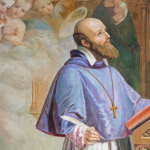Catholics need shepherds like Benedict
January 4, 2023
By Father Vincent Hawkswell
Cardinal Joseph Ratzinger was appointed prefect of the Vatican Congregation for the Doctrine of the Faith by Pope St. John Paul II in 1981, just months after I was ordained a priest. He became Pope Benedict XVI in 2005. During my entire time as editor of The B.C. Catholic, this man – whose episcopal motto was Co-operatores Veritatis (“Co-operators of the Truth”) – was someone I could rely on for the truth about the Catholic faith and how to present it. I still have his picture on my wall.
I began to read his books, and I found a number of truths I might never have understood clearly without him. Let me give two examples.
In teaching The Catholic Faith in Plain English, I have often noticed tension between those who advocate justice and retribution and those who advocate mercy and compassion.
“You puzzle me,” one man said. “On the surface, you uphold the Church’s teaching, but underneath, you really are compassionate.”
Some people even question whether the “vindictive” God of the Old Testament can possibly be the “forgiving” God of the New Testament!
In fact, God is shown to be both just and loving throughout the Bible. For example, Jesus, having come not to judge the world but to save it, was uncompromisingly stern toward sin, but rich in mercy toward sinners. St. John says that God is both light (or truth) and love.
However, “it is Christ’s cross that ultimately reveals how two qualities that appear to be in tension can actually be reconciled,” noted Dr. Paul Coulter, a lecturer at Belfast Bible College: “namely how a holy God can make sinners right with Himself without leaving sin unjustly unpunished.”
Various Popes have described the “tension.” In his encyclical Veritatis Splendor (“The Splendour of Truth”), Pope St. John Paul II said that on the one hand, we must care about our neighbour’s “true good” and “authentic freedom,” which we will not foster by “concealing or weakening moral truth.” On the other hand, we must never separate our “clear and forceful presentation of moral truth” from “a profound and heartfelt respect” for the person to whom we present it.
In his encyclical Humanae Vitae, Pope St. Paul VI said that on the one hand, “charity toward souls” demands that we “omit nothing from the saving doctrine of Christ.” On the other hand, we must present this doctrine “with tolerance and charity.”
However, it was Pope Benedict XVI who first showed me clearly how mercy and justice, far from being in tension, actually co-inhere (to use Bishop Robert Barron’s word).
“God’s passionate love for his people – for humanity – is at the same time a forgiving love,” the Pope said in his first encyclical, Deus Caritas Est (“God is Love”). “It is so great that it turns God against himself, his love against his justice… so great is God’s love for man that by becoming man he follows him even into death, and so reconciles justice and love.”
Pope Benedict himself had experienced the tension between love and justice. During a meeting with priests of the Bolzano-Bressanone Diocese in northern Italy, he noted that the Church does not baptize children indiscriminately, but only when there is “a realistic hope” of their being “brought up in the Catholic religion.”
Then he added, “When I was young I was rather more severe. I said: the sacraments are the sacraments of the faith, and when the faith isn’t there – where there’s no practise of the faith – the sacraments can’t be conferred.” However, he said, he came to realize “that we have to follow instead the example of the Lord,” who was “very open with the people who were at the margins of Israel at that time.”
Later, when I read his book Introduction to Christianity, the Pope (then Cardinal Joseph Ratzinger), made me understand what it means to say that Jesus “descended into hell” (“to the realm of the dead,” not to “the place of eternal damnation,” as Pope St. John Paul II noted).
No one knows quite what death is, the cardinal said; but let us start with Jesus’ cry from the cross – “My God, why have you forsaken me?” – a cry of “radical loneliness.”
In our innermost being, we are each utterly alone, he said. However, no one can live like this: we need human company. That is why “loneliness is the region of fear,” like that of a child alone in the dark, or a man alone with a dead person. It is “not fear of anything in particular, but simply fear in itself.” It cannot be overcome by reason, but only by the presence of another person.
The Old Testament has the same word – Sheol – for death and hell (small “h”) because it regards them as ultimately identical, he said. Both are “absolute loneliness.”
“The place of eternal damnation” is “the loneliness into which love can no longer advance,” he explained, for the damned choose it freely. Jesus respects their choice; he does not invade Hell.
However, he did invade Sheol: he “strode through the gate of our final loneliness”; he “went down into the abyss of our abandonment,” where no other voice can reach us. At that moment, when he accomplished “the supreme act of love by descending into the night of death,” he brought “the journey of the Incarnation to its completion.” Now he “clasps the hand of Adam” – of all men and women who await him after death – “and brings them to the light.”
Death “is no longer the path into icy solitude,” he said, using the imagery of the poet Dante Alighieri in his Divine Comedy: Inferno. “By dying, he has destroyed our death.”
Pope Benedict, then, became my mentor as I taught the Catholic faith, through my work as a pastor, at The B.C. Catholic, and now in The Catholic Faith in Plain English.
As prefect of the Congregation for the Doctrine of the Faith, Cardinal Ratzinger became known in certain circles as the “German rottweiler” because of his uncompromising adherence to the truth.
I preferred to call him our “German shepherd”: strong, reliable, unafraid, our sure defence against error.
Catholics need such a shepherd. Though we may find the image disagreeable, Christ described us as sheep and himself as our shepherd.
We tend to focus on the loving shepherd who leaves 99 sheep in the desert to find the one that is lost, leading them beside restful waters to revive their drooping spirits.
We tend to forget what I learned from experience in childhood: that sheep are very silly animals. They scatter without someone to herd them. They follow anyone who looks like a leader. In search of fresh grass, they become entangled in thorns. Released, they run right back into the hedge.
God promised that he would give his people shepherds after his own heart. Jesus told Peter to feed his sheep.
All our shepherds, not just our late German shepherd, uphold the truth – popular or unpopular – because of their compassion for the sheep.
Eternal rest grant unto him, O Lord, and let perpetual light shine upon him; may he rest in peace.



